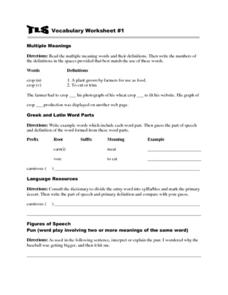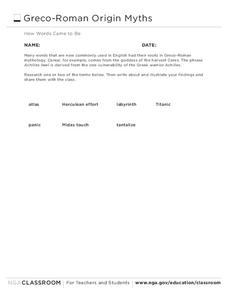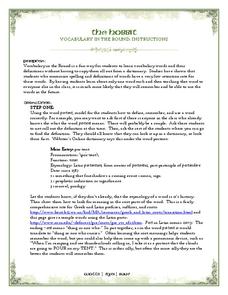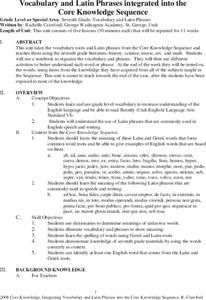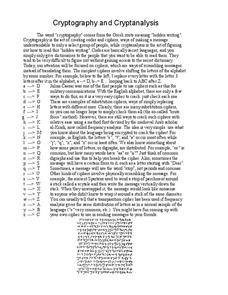Curated OER
The Star Fisher
What a terrific way to discuss racism in the 1920's. Learners read a story called The Star Fisher by Laurence Yep. It is about a Chinese American girl who experiences racism and prejudice after moving from Ohio to West Virginia....
Curated OER
Where Do Words Come From?
Students examine the foreign-language roots of various English words. Using the dictionary's word derivation notes and abbreviation key, they develop a list of words with a foreign-language origin, and create a class dictionary.
Curated OER
Neuroscience Word Origins
In this neuroscience activity, students match neuroscience words with the illustration that represents the original meaning of the word in Greek or Latin. This activity has 10 matching questions.
Pennington Publishing
Vocabulary Worksheet #1 & #2
These two worksheets cover several grammatical topics. Pupils work on words with multiple meanings, Greek and Latin word parts, word connotations, academic language, and more. The result is seven quick exercises that could be used...
Curated OER
Journey to Understanding Vocabulary
Students examine word parts. For this word study lesson, students practice breaking words into parts and using their knowledge of Greek roots, prefixes, and suffixes determine the words' meanings.
Curated OER
Connection to Language Arts-Hidden Meanings
In this etymology learning exercise, learners read about the history of naming words and how words are named. They think critically by answering three questions about the meaning of words, etymologies and the derivation of words.
Curated OER
Ordinary People: Desktop Teaching
Turn the pupil into the teacher to help your learners pick up and retain vocabulary from Ordinary People by Judith Guest. Each individual selects a word, studies it in depth, and then teaches their word to the rest of the class, one...
Curated OER
Greek Prefixes In Science
Seventh graders look into their science textbooks to find words that utilize the Greek prefixes, "anti," "epi," "endo," and "micro." Student pairs complete a worksheet embedded in the plan where they list as many of these words as they can.
Curated OER
Islamic Roots of Judaeo-Christian Culture
Students discuss the stereotypes associated with the major religions of the world. Using primary sources, they summarize the information and role play various roles to the class. They participate in a debate between the different points...
Curated OER
Words with Less Common Derivatives
In this derivatives worksheet, students review the definition of derivatives and then some examples. Students then find a derivative on their own for the word oppose and complete activities for its derivative. Students then find...
Curated OER
The Language of Science
In this language of science worksheet, students use the list provided to guess the meaning of each of the list. Students apply root words, prefixes, and suffixes to gain meaning of other science words.
Curated OER
Tropism
Students conduct various experiments on tropism. For this biology lesson, students explain how gravity affects the growth of plant roots. They identify the different types of tropisms.
Texas Education Agency (TEA)
Byzantine Architecture
View Byzantine architecture from the comfort of your classroom. A PowerPoint presentation introduces important vocabulary terms and examples of Byzantine architecture in the ninth instructional activity of the 11-part series. A Jeopardy...
Prestwick House
Wuthering Heights
How many ways can you break down a classic novel? Based on the acclaimed Romantic-period novel by Emily Bronte, the Wuthering Heights activity pack includes a pre-reading exercise. Next, learners create a resume for one of the...
Curated OER
Greco-Roman Origin Myths
In this Greco-Roman origin myths worksheet, students read a list of 7 commonly used terms. Students research the origin of one or two of these terms and write about and illustrate their findings. Example: atlas, Herculean effort, tantalize.
Novelinks
The Hobbit: Vocabulary in the Round
Blundering, audacious, obscurest. Class members develop strategies for teaching each other vocabulary words drawn from The Hobbit.
Curated OER
Vocabulary and Latin Phrases Integrated into the Core Knowledge Sequence
Students organize the vocabulary roots and Latin phrases from the Core Knowledge Sequence. In this word study lesson, students complete a 57 page packet of activities to increase the vocabulary base of Latin phrases.
Curated OER
Cognate Detectives
Second graders examine how some root words are the same in English and Spanish. They explore cognates in Spanish and English language.
Curated OER
What are Homographs?
Take a minute to introduce your class to homographs. Because the differences in the meanings of these words is not minute, and because no word bank is provided, some learners might struggle. However, the provided answer key means you can...
Curated OER
Cryptography and Cryptanalysis
In this cryptography and cryptanalysis instructional activity, 8th graders read the explanation and example for codes and ciphers, then answer 2 questions and decipher 2 messages.
Curated OER
Linnaeus' Latin Lingo
Students use Latin and Greek words to figure out species names for whales.
Curated OER
Animal Classification
Learners are introduced to the concept of classification as it relates to objects, information, and characteristics. In this classification lesson, students research a variety of animals. Learners study the Linnaeus's system of...
Curated OER
Onomatopoeia
Fifth graders investigate onomatopoeia. In this reading lesson, 5th graders create a list of onomatopoeic words from books read and brainstorm words of their own in small groups.
Curated OER
Pyrotechnics
Students discuss pyrotechnics and what they have noticed about their height and speed. They think about the path which fireworks follow which is a parabola. They follow multiplication patterns to determine the Zero Product Property and...





